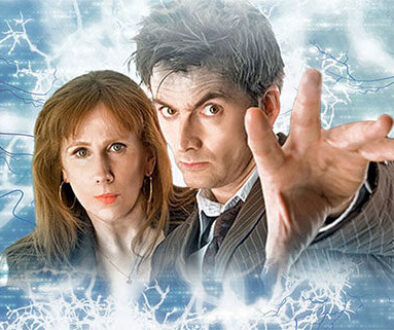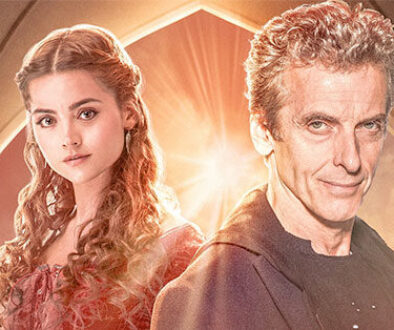Lights Out Review
Patrick Kavanagh-Sproull gives his verdict on Holly Black’s 12th Doctor eshort.
 It seemed somewhat inevitable that after the success of the 11 Doctors, 11 Stories venture, Puffin would commission a Twelfth Doctor tale to coincide with the new series and Peter Capaldi’s delightfully glacial interpretation of the Time Lord. Holly Black, writer of The Spiderwick Chronicles, is the woman given the job, one, undoubtedly, tougher than the eleven authors before her. Having written Lights Out over the summer, Black was dependent on scripts – much like the men behind this year’s trio of hit-and-miss New Series Adventure novels – but she had the benefit of seeing Deep Breath while doing revisions. It’s evident in the text and strong characterisation of the Twelfth Doctor helps an already enjoyable, engrossing adventure.
It seemed somewhat inevitable that after the success of the 11 Doctors, 11 Stories venture, Puffin would commission a Twelfth Doctor tale to coincide with the new series and Peter Capaldi’s delightfully glacial interpretation of the Time Lord. Holly Black, writer of The Spiderwick Chronicles, is the woman given the job, one, undoubtedly, tougher than the eleven authors before her. Having written Lights Out over the summer, Black was dependent on scripts – much like the men behind this year’s trio of hit-and-miss New Series Adventure novels – but she had the benefit of seeing Deep Breath while doing revisions. It’s evident in the text and strong characterisation of the Twelfth Doctor helps an already enjoyable, engrossing adventure.
Black draws lightly from Charlie Higson’s The Beast of Babylon, setting her story in a very deliberate window. Think back to Deep Breath and those pivotal final scenes. I’m not talking about Matt Smith’s cameo or “Clara, I’m not your boyfriend” but, in fact, the Doctor’s off-screen trip to collect coffee. When he turned up one episode later in Coal Hill School’s stationary cupboard, he was equipped with two pumpkin spice lattes (my own personal head-canon) but this isn’t average Glaswegian coffee (although our coffee is legendary), instead it’s ground on and purchased from the Intergalactic Coffee Roasting Station (ICRS, pronounced ICARUS to the regulars). This is where Holly Black places her story and it’s a brilliant, barmy and totally unique setting for a brilliant, barmy and totally unique story.
Much like Mummy on the Orient Express, Lights Out has the Doctor turn detective when a rash of deaths strike the seemingly ordinary space station (fans of the Fourth Doctor will recognise the planet Chloris as ICARUS’ plantation: “[it] has an ideal climate for growing the super-caffeinated coffee beans that make it famous”. Not just a green blob at the bottom of a hole, then?). Interestingly, coffee in the far future is no longer simply a hot beverage but the caffeine acts as a stimulant, a sedative or a narcotic, depending on the creature, meaning everyone is primed to kill for a good cappachino. But whenever the lights cut out, there’s a fresh body to add to the pile so it’s a race against time for the Doctor to determine the truth and discover who this serial murderer is. Start the clock (again)…
Black’s viewing of Deep Breath seemed to have helped her a lot because her characterisation of the Twelfth Doctor is pinpoint accurate (miles ahead of Mike Tucker, James Goss and Justin Richards although, in all fairness, a couple of them did get it pretty spot on), nailing his user-unfriendly efficiency, sarcasm and total refusal to adhere to social niceties. A solid rendering of Capaldi’s incarnation was necessary for the short Lights Out to work and it truly did, a far cry from the three books released last month. To put it into a cake analogy (why not?): Lights Out is a perfectly baked cupcake next to the three slightly undercooked gateaux.
As the Doctor set off for the coffee on his own (“Turns out I’m the fetching sort after all,” he says at one point) Clara is absent from Lights Out but this works entirely in the story’s favour. While it would have been nice to have seen Black utilise Clara, her deliberate omission is necessary to the story. In his investigation, the Doctor enlists the help of Fifty-one, a female alien he once encountered in her nursery many years (and bodies) ago. Fifty-one’s remit is “help me, remind me how brilliant I am, notice things that I’ve already noticed, ask me questions whose answers are so blazingly obvious that it would never have occurred to me to explain” and she does the job serviceably. While, by no means, a standout companion it is nice to see the Doctor have someone different tag along for the investigation, particularly someone that isn’t human.
I have little to fault with Lights Out bar one thing: length. Holly Black’s story gets off to a rip-roaring start, speeding through the plot with the foot pressed firmly on the accelerator. Black’s story has a beginning, middle and an end but it’s frustrating when the middle feels like page 5. However, it’s not her fault, in fact, her colleagues have quite a lot to answer for. It’s clear that the 12 Doctors, 12 Stories anthology (out today as a normal book and a sexy, thigh-slapping slipcase edition) had a fixed word limit and cheeky Marcus Sedgwick and Derek Landy – who wrote the two longest stories – gobbled up more than their fair share, cutting back on Holly Black’s word limit. Luxuries like TARDIS interior scenes and bookending sequences showing the Doctor leave Clara and then reunite with her cannot be afforded because of the tight word-count but also because Black didn’t have a clue what the TARDIS control room would look like.
Verdict: 8/10
By no means a flop, Lights Out could have benefitted from a longer length but that’s not Black’s fault – or any of the other authors’ in all seriousness – and she makes up for the contracted word-count with a firm grasp on the character of the Twelfth Doctor, a distinctive companion, a scintillating plot, a bonkers setting and a surprisingly emotional denouement.








